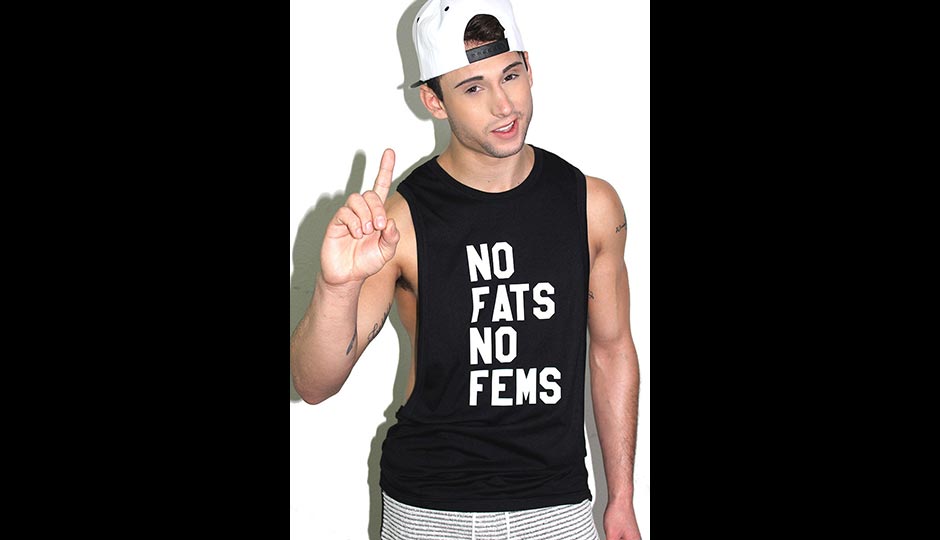OPINION: It’s Time to Ban “No Fats, No Fems”

Marek+Richard’s controversial tank.
I couldn’t help but find myself annoyed this week to find out that a term I thought was going to fade out eventually just went viral.
Thanks to the gay clothing brand Marek+Richard, members of our community can now rip the runway wearing “No Fats, No Fems” tanks in broad daylight. There has been plenty of backlash about the now-sold-out apparel, and the company tried to clean up after the debacle by saying it was all in the name of “satire,” but no one was buying it.
If you aren’t familiar with the origins of the term, it’s basic sexist body-shaming lingo on gay dating apps — such as Grindr and Jack’d — that has become a part of constant trend of exclusion within the LGBTQ community.
It’s time to stop looking at this as part of the social norm of dialogue amongst ourselves. Such terms are now being linked to growing eating disorder problems within our community. This hypersexualization of body types and preferences is affecting how we judge one another and accept one amother in a space that’s marginalized enough as is. Furthermore, gay media has been proven to depict tighter bodies and hypermasculinity at rates that rival those of many of the heterosexual publications around.
And when it comes to sexism within the narrative, there is proof that much of what gay men consider female-like in other men can be tied to race as well. A recent study on gender found that Asian gay men were seen as less masculine based on the way their body was portrayed in the media compared to black gay men, who were seen as dominate and aggressive. Such stereotypes stems= from a culture that buys into body-shaming and fragile standards of masculinity.
Terms like “no fats, no fems” don’t help this. I will never forget my gay college experience and being judged based on the rigid standards of what black gay men were supposed to look like. It was intimidating at times to go to gay bars and pride events and see countless men shirtless with abs and not feeling sufficient enough to be approached or accepted by them in those spaces. The experience made me feel like I wasn’t good enough — that I was lacking in social capital. I’ve never had abs, and probably never will, and such an admission to others made them presume I was less masculine and that my gender expression was already decided upon. “You’re definitely a bottom,” a guy once told me. “You’re too round to be a top.”
Let’s just say never judge a book by its volume.
Although I never went through a phase of binge eating, moments such as this made me very self-conscious of how my gayness appeared to others. After finding personal self-care and a supportive romantic partner, such notions of body image and performance of my masculinity in regards to it has changed.
But I am fortunate to have that level of support and guidance. Many others in our community lack the proper resources and support systems to feel motivated. Such exclusion is a crisis we are unfairly inflicting upon ourselves. Let’s finally get a grip — it starts on the dance floor, online, and in our friend groups. Let’s stop with the body-shaming and the sexist presumptions on our gender expression.
We are better than what meets the shallow eye, because we expect so much from others to treat us as such. Let’s not be hypocrites. It’s time to drop “no fats, no fems” from our vernacular.


